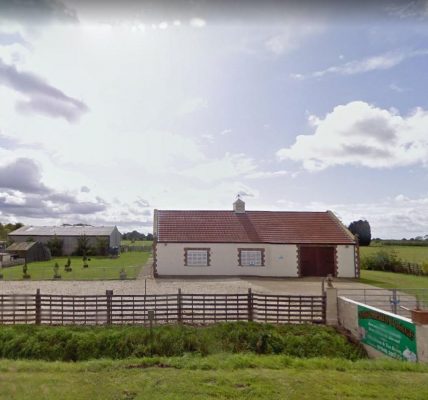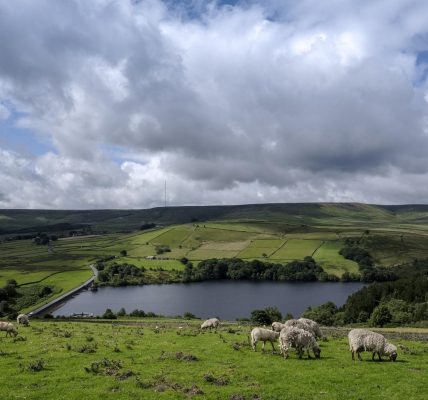Meet the former hairdresser turned Mangalitza pig farmer who supplies top chefs and has saved a rare breed from dying out
Meet the former hairdresser turned Mangalitza pig farmer who supplies top chefs and has saved a rare breed from dying out
Hairy pigs near Helmsley have attracted the attention of the Hairy Bikers, and former hairdresser who owns them has now become a major protagonist for the breed.
Lisa Hodgson started her Otterburn Mangalitza herd at Low Farm, Carlton nine years ago following a visit to Beamish Museum where she and her husband, Tim Otterburn, first saw what at a distance they mistook for sheep.
Lisa said she had wanted to have animals on the farm since she and Tim had got together around a dozen years ago, but that Tim had initially resisted having come out of cattle and sheep some years previously on the 210-acre farm that grows spring and winter barleys and grass for silage.
“I’m from Easington Colliery in County Durham where my dad was a miner. I’d not grown up on a farm and I told Tim I thought it was a bit of a rubbish farm without any animals.
“We’d gone to Beamish, seen these hairy pigs and I just thought they were awesome. We were told they were Lincolnshire Curly Coats, but when we came home I discovered the breed had been extinct since the 1970s.
“That’s when I found out they were Mangalitzas and I began to research them. I was really enthusiastic. I’d read about them being a slow-grown, outdoor-reared animal that you keep for over two years. That really appealed on animal welfare because it felt like we would be giving them a good life, more so than commercial pigs, but Tim initially said we weren’t having them.”
Lisa said she found a novel way around ensuring that her dream of starting the herd came about.
“After a while I decided on new tactics. I plied Tim with half a bottle of whisky and started talking about having kids again. We’d both had children from our former marriages. It did the trick. Tim said: ‘I think we’d better have them pigs instead’.”
Tim made one stipulation to Lisa, that the pigs would not be ‘freeloading pets’ and that they would have to pay their way.
Lisa has since found new markets, come up with her own unique produce and now supplies high-end restaurants and chefs. She is also now the Mangalitza breed representative in the British Pig Association (BPA) and came up with the ‘Great Manga Move’ to help protect the bloodlines last year.
The Otterburn Mangalitza herd currently runs to 22 sows with five breeding boars and with around 130 pigs overall. She said her success with buyers has come from understanding the breed and its qualities.
“They call them the Wagyu pig because of their marbling. They began making their mark in the UK around the same time as Wagyu beef. They are made up of around 60 per cent meat and 40 per cent fat and I was told that the meat looks after itself, as it is well marbled and is less dry than other pork. The thing was to find the right product to sell the fat.
“My original intention had been to rear them on and sell as whole carcasses, but there were very few butchers who knew much about them. Marco Peerderman, head butcher for James Oliver in London, took us under his wing. He came up for a few days to look at what could be done.
“Marco designed a way of butchering that meant we could sell them in cuts, but we still needed a use for the fat.”
One of the hotels Lisa was by then supplying mentioned that they were struggling to achieve a decent black pudding. Lisa said this set her thinking.
“I got somebody to make one using Mangalitza fat in it and we found our unique product. Everyone loved it because the Mangalitza fat doesn’t leave that greasy feeling you can sometimes get with others. Ours has this lovely moisture content and is slightly sweet.
“Marco arranged for samples to be tried at a Christmas event at Sofitel Hotel in St James’s, London and we haven’t looked back. It just went absolutely bonkers with orders from chefs and restaurants.
“Our Mangalitza pork and black pudding have now been seen on all sorts of TV programmes from Saturday Kitchen to the Hairy Bikers – and our pigs have been on The US Vet and Springtime on the Farm.”
The past year has been challenging with the shutdown of the hospitality trade and Lisa reduced her breeding programme accordingly, but she is back under way now. Lisa also said the breed made history last year with the ‘Great Manga Move’.
“Every year the BPA does a survey to see how safe a breed is in terms of bloodlines. To be safe in the UK a breed needs to register a score of around 50, but the Mangalitza was at 29. I thought we really needed to do something about this.
“One bloodline, the sow line Delight, saw me as the only one in the UK who had it. My feeling was that anything could go wrong at our farm, but if it did that bloodline would be gone.
“I contacted all the 25 Mangalitza breeders in the country about doing a genetic swap.
“My idea was that we would breed our individual rare lines, have them all born around the same time and find a suitable venue where we could meet up, following all the rules and regulations, and swap bloodlines, creating a better spread around the country.
“It worked! Jane Matthews, chair of the BPA suggested Sedgemoor livestock market. They couldn’t have done more for us. I had my list of who was swapping what with who and we all had such a thrill doing it.
“We need more breeders. I’d be delighted to hear from anyone who wants to start.”
Lisa’s next challenge is to extend the bloodline exercise to importation from Europe, which she is looking towards having organised for spring 2022.










